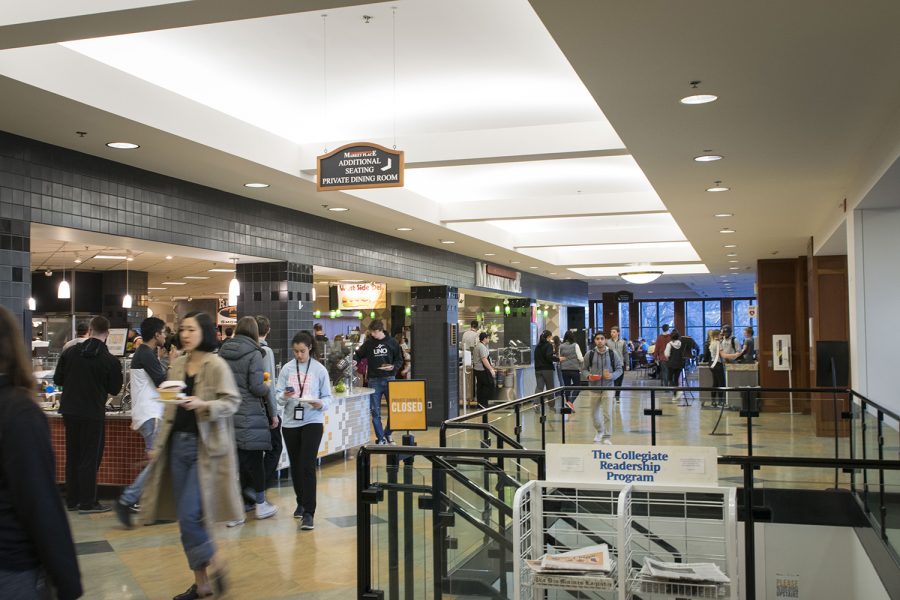University of Iowa researchers find a link between meal swipes and social connection
A study conducted in the College of Education has determined there is a link between a student’s social connectedness and the amount of meal swipes they use.
Students walk through the cafeteria at Hillcrest Dining Hall on Wednesday, March 8, 2017. The university is taking part in a food waste audit to track the amount of trash students generate during dining hall hours.
April 17, 2019
During the first year of college, the social connections students make with their peers can determine their future at a university, according to a recent University of Iowa study.
Researchers in the College of Education have studied how student meal swipes in the dining halls can help determine social connectivity.
The research found that when students visit a dining hall, the amount of time between their meal swipes and the meal swipe of the person after them can determine how often they eat with friends, said education Professor Nicholas Bowman, a researcher on the study.
The Computer Science Department had previously conducted research on the meal-swipe data of students, Bowman said. The data were compared with GPA and second-semester retention rate but were never published. Bowman and his colleagues expanded upon the research, he said.
Observing how often students interact with others can predict student retention and graduation rates, Bowman said.
“The thing I find so shocking about that is even at the end of the first week this meal index is related to graduation,” Bowman said. “So it suggests that these dynamics really start early on when students are enrolled in school.”
The research looked at students who had graduated any time in the last nine years and they also looked at retention to the third and fourth year, Bowman said. The researchers also looked at alternative explanations for why the student meal index might be lower, he said.
RELATED: Housing and Dining discusses results from resident-satisfaction survey
If students leave the UI early on in the first semester, their meal index is going to be lower than those who stayed for the entire semester, Bowman said. The researchers did additional data analysis through observing student meal swipes during the spring semester and noticed the same results as in the fall semester, he said.
Through living in the residence halls, first-year students have the opportunity to interact with and form friendships with the people living around them, said Von Stange, the assistant vice president for Housing & Dining. This gives students people they may choose to eat with frequently, he said.
“When [students] move from their homes that they’ve spent 18 years in or longer to residence halls, that’s a definite change,” Stange said. “That sense of connectedness, that sense of belonging is critically important, and we can’t underestimate that.”
Housing & Dining has a residence-education model that focuses on conversations among residence assistants and students to get a sense of how connected they feel to the university and their sense of belonging, Stange said.
Depending on the time of day and what meal students eat, they may choose to go to the dining hall by themselves. UI first-year student and Hillcrest resident Dana Schmidt usually eats breakfast by herself but always eats other meals with a group of friends, she said.
Through living in proximity to other students, it’s easy to make connections with people, Schmidt said. Living in a residence hall is how people make connections during their first year, and it was crucial in her experience at the UI, she said.
“I feel like getting the bigger meal plan is a better way to be social,” Schmidt said. “Because everybody just goes [to the dining hall], and you have all the meal swipes you can just keep going to the dining hall with new people.”






